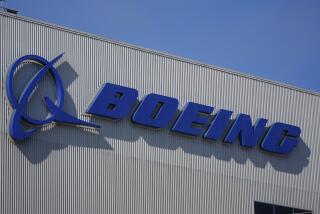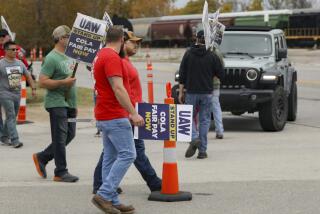Talk of New Bid Reverses Skid in UAL’s Stock : Airlines: The carrier must placate its employees, who had hoped their bid would fly but are now left without a contract.
- Share via
The collapse of a labor-management buyout of UAL Corp. sent the company’s stock into a nose dive Tuesday only to partly recover late in the day on speculation that a new offer for the parent of United Airlines may be imminent.
In the absence of a takeover, UAL and its Chairman, Stephen M. Wolf, face a number of management challenges just as airline industry earnings are slumping amid sluggish passenger volume and heightened competition in the form of fare wars.
Wolf faces an army of disgruntled employees without labor contracts who had hoped to be owners and had been willing to grant wage and other concessions.
Analysts acknowledge that UAL has much fence mending ahead--two employee groups have already called for Wolf’s resignation--but some contend that labor negotiations this year probably won’t be made more difficult by the buyout’s unraveling. Negotiations will continue for months, and the threat of a strike is not likely for some time.
Wolf “has got a long row to hoe. It’s difficult to say where the starting point is even going to be on these (contract negotiations),” said Thomas Longman, an airline industry analyst with Bear, Stearns & Co., a New York investment firm.
“I think right now they just have to concentrate on running the company and let the dust settle,” said Ray Nedl, an airline analyst with Dillon, Read & Co., a brokerage in New York. “United Airlines is still a strong franchise with a good management.”
UAL’s non-management directors said late Monday that the company should remain independent, killing hopes for a revival of the faltering $300-a-share buyout bid.
UAL’s stock reacted to the announcement Tuesday by plunging more than $32 a share in heavy trading on the New York Stock Exchange--a fall that helped precipitate an early selloff in many other stocks. Then new takeover rumors brought the stock back to close at $170 per share, down only $8.375 from Monday’s close.
The price had gone as high as $294 a share after the labor-management bid was announced. It started at around $150 before takeover speculation arose in July.
Stock arbitragers, who speculate in takeover stocks, said that some party was buying large amounts of UAL stock. One arbitrager said that Bear Stearns had acquired 1.5 million shares, presumably on behalf of a client, but that purchase could not be confirmed Tuesday.
Buyers were variously rumored to be big-time investors Donald J. Trump, Saul P. Steinberg, Robert M. Bass or Coniston Partners, an investor group that two years ago forced a restructuring of UAL but now owns less than 5% of its stock. Texas investor Bass was earlier said to be interested in UAL and is believed to own about 2% of its stock.
The purchaser apparently is not Marvin Davis, who started UAL’s takeover turmoil in August with a $240-a-share bid. The Los Angeles billionaire can’t buy more UAL stock because he signed a standstill agreement with the company, but he could make a new, higher offer.
A UAL spokesman said the company had not made any announcements and does not comment on the activity of its stock.
The unraveling of the labor-management buyout has put a strain on relations between UAL executives and rank-and-file employees, observers noted. Wolf, in a statement Monday, tried to make the best of the situation by pointing to a “substantially improved working relationship” between management and the pilots union.
“The company has a big job ahead,” said Frank A. Spencer, professor of transportation and labor relations at Northwestern University’s J. L. Kellogg Graduate School of Management.
“Everybody has to sit down and decide what side their hair is going to be parted on and how they’re going to approach it,” said Spencer, who was a pilot with American Airlines for 30 years and a union official for nine years.
“There are a lot of issues that everybody has to come to grips with now that the buyout has stalled,” said Hank Krakowski, spokesman for the pilots’ union. Pilots had been sporting buttons reading “I’m The Boss” and “Owner-Operator.”
“It clearly was kind of a punch” when the buyout fell through, Krakowski said. The union still hopes to revive its bid, he said.
“Wolf’s credibility with employees is poor and it is still in the best interest of the company that he resign,” said Bill Palmer, organizer of a group that claims to represent 25,000 non-union UAL employees.
The relationship between flight attendants and management “has been difficult for two years,” flight attendants union President Pat Friend said. “I don’t see how it could get much more difficult. . . . This certainly is a chance for them to demonstrate this new working relationship.”
The flight attendants, who had joined the pilots in the buyout only last week, were particularly disappointed that the UAL board adjourned Monday without taking any measures to protect the company from hostile takeovers, Friend said.
The machinists union opposed the buyout and had called for Wolf’s resignation.
But employees’ barbed comments do not mean that contract negotiations, which as a rule are contentious in the airline industry, will become any more troublesome, analysts said.
“Certainly events aren’t going to make negotiations any easier, but I guess at bottom I’m a pragmatist,” said Edmund S. Greenslet, an analyst whose Florida firm publishes Airline Monitor, a trade publication.
“There will be a certain amount of rhetoric that’s mainly for public consumption, but I really don’t think that the outcome would be materially different than it otherwise would have been,” Greenslet said.
Times Staff Writers Denise Gellene in Los Angeles and Paul Richter in New York contributed to this story.
More to Read
Inside the business of entertainment
The Wide Shot brings you news, analysis and insights on everything from streaming wars to production — and what it all means for the future.
You may occasionally receive promotional content from the Los Angeles Times.







